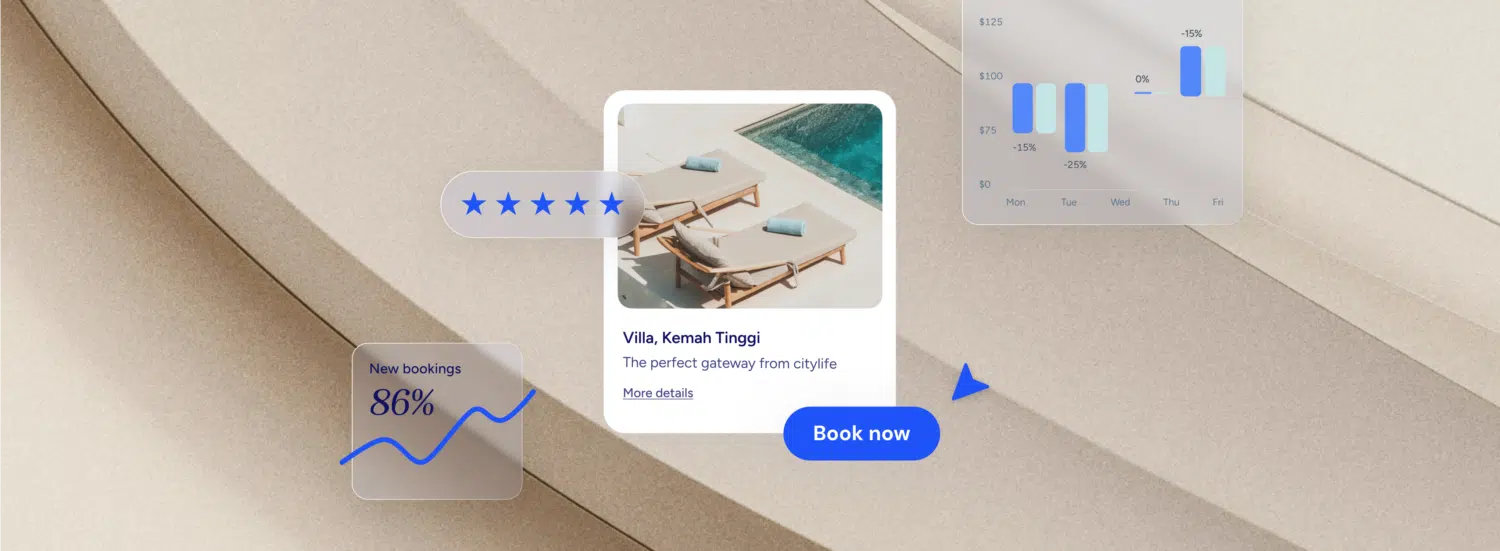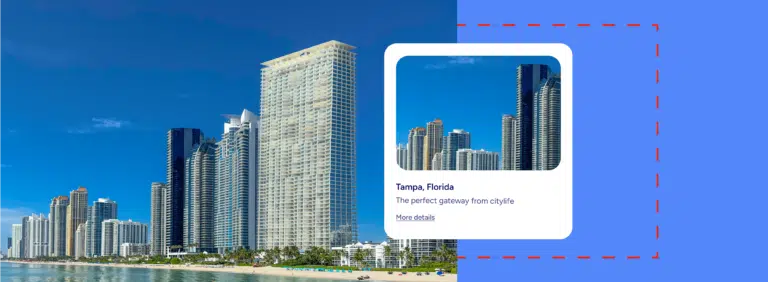Considering starting a vacation rental business? If so, it’s important to do your research beforehand to make sure you are set up to succeed. First, you need to look at the current state of the industry to establish reasonable goals to formulate your plan. So we will start with a look at the most recent industry forecast.

Over the past few years, the short-term and vacation rental industry has seen significant gains in demand and the length of guests’ stay, contributing to an average overall increase in revenue for hosts and property managers. Yet it has also reached all-time highs in the number of listings on the market, making competition fierce.
Most projections see a continued increase in the supply, demand and total revenue for the short-term rental and vacation home industry, Predictions for the industry are expected to reach $96.85bn in revenue in 2023 and to continue to rise on target with an annual growth rate of 2.69% (Statista).
Under the right circumstances, a short-term rental business can become a relatively passive stream of income, but these results don’t come from simply purchasing a property or two and listing them on sites like Airbnb.
Running a successful vacation rental business requires a business plan, marketing strategy and a financial strategy. It requires research, planning, financial investment and significant time and commitment. It also requires a number of tools that allow you to run your rentals effectively and to grow them into a thriving business – at whichever scale you hope to achieve.
In this article we will cover the basics of how to start a vacation rental business:
- Researching and planning your vacation rental business
- Options for investing in your short-term rental property
- Designing, renting out and maintaining your property
- Insights into tools that help you run and scale your business effectively.
Let’s start with the basics.

What is a vacation rental business?
Short-term rentals (STRs) refer to private properties that are rented out for short-term use (typically from a number of days to weeks). They may be used by travelers, business professionals, nomadic workers or anyone looking to relocate temporarily. Short-term or vacation rentals differ from hotels in that they generally offer more facilities (ie. kitchens, appliances, private outdoor areas etc.), more privacy, and sometimes greater access to authentic, local culture or a unique lodging experience.
A short-term rental business involves acquiring, maintaining, marketing and renting out these properties to guests. Running a vacation rental business may mean that you own your own properties or that you rent and manage the properties for the owner. A short-term rental business can be specifically focused on vacation rentals or leisure properties, which are usually situated in geographic locations that are tourist destinations, or they can be urban rentals that are likely to attract both tourists and corporate travelers. Depending on which population you want to serve, the amenities you provide, your seasonal budgets, your nightly rates and your business plan will need to be adjusted accordingly.
While there are some differences in how one would run a vacation rental as opposed to a short-term rental that is used for other purposes, this doesn’t really affect how you would start the process. Therefore, for the sake of consistency in this article we will be using the term “vacation rental” but the tips here are relevant for getting started with any “short-term rental”.
What Traits Define a Successful Vacation Rental Business Owner?
A typical vacation rental business owner embodies the spirit of entrepreneurship, bringing distinctive qualities to the table that set them apart.
- Adaptability: These individuals thrive on diversity, adjusting seamlessly to ever-changing industry trends and customer demands. Their ability to pivot and embrace new strategies is crucial in a dynamic market.
- Visionary Mindset: Driven by a relentless desire for growth, vacation rental owners consistently seek ways to enhance their offerings. They identify areas for improvement and innovate to deliver exceptional guest experiences.
- Perseverance: This is a critical trait. Owners are fueled by an unyielding drive to succeed, often going above and beyond to meet—and exceed—goals. Their ambition propels them to scale new heights continuously.
- Risk Management: Calculated risk-taking is a staple in their approach. While eager for success, these owners carefully evaluate potential risks and rewards, balancing ambition with caution to secure a stable yet prosperous venture.
- Problem-Solving Skills: Their work is never truly complete, which means problem-solving is part of their daily routine. They continuously seek to refine and streamline operations, ensuring both efficiency and effectiveness.
- Goal Orientation: These owners are intensely focused on their objectives. They meticulously set and pursue goals, navigating challenges with a strategic mindset aimed at long-term achievement.
In summary, the traits of a vacation rental business owner blend adaptability, visionary thinking, and perseverance with a keen sense of risk management and problem-solving—each critical for reaching the pinnacle of success in this competitive industry.
If you have already acquired a vacation rental and are looking to increase your bookings check out these recent articles for the next steps in your journey:
- The Ultimate Airbnb Host Checklist to Secure More Bookings
- Reducing Double Bookings on Airbnb and Other Channels
- Sustainability Matters: 8 Ways to Make Your Vacation Rentals More Eco-Friendly.

How much profit can I make from vacation rental properties?
According to data from Mashvisor from August 2022, the median monthly Airbnb rental income in the US reached $3,196 per property (vs $1,787 for a traditional rental income). These numbers can, of course, fluctuate based on the quality of the property, the level of service provided and the efficiency and effectiveness of internal operations.
No matter what kind of property you’re renting, one of the key strategies for maximizing your profit is implementing a dynamic pricing model that reflects dips and rises in demand. Using a dynamic pricing tool, your prices can automatically be adjusted based on market demand, making it effortless to optimize your prices and encourage bookings. This way, your prices will adapt during shoulder seasons (the periods of time between the peak season and the offseason) and will invite the most revenue possible when people are most willing to pay.
Determining the right rental rates for your vacation property is crucial to ensuring profitability while attracting the right guests. Here’s a comprehensive guide to help you set optimal rates.
Understand Your Costs
Assess Total Expenses: Begin by calculating all costs associated with your property. This includes fixed expenses like mortgage payments, property taxes, internet, insurance, and variable costs such as utilities, guest supplies, and maintenance. Ensure that your rates cover these expenses while still allowing for a profit margin.
Analyze the Market
Research Competitors: Gain insights by exploring nearby vacation rentals similar to yours. Look into their pricing, amenities, and occupancy rates. Understanding what the competition offers will give you a benchmark to align your rates without pricing yourself out of the market.
Differentiate from Hotels: Remember, vacation properties often provide more space and privacy than hotels, which can justify higher rates. Yet, ensure these are competitive enough to tempt potential guests away from hotels.
Implement Smart Tools
Consider Dynamic Pricing: Leverage pricing tools and services that automatically adjust your rates based on market demand and trends. Platforms often use algorithms to tweak prices in real-time, ensuring competitiveness while covering your base costs continually.
Factor in Additional Fees
Evaluate Extra Charges: Decide whether to include additional fees such as cleaning, late check-outs, or premium services. Position these as optional to give guests flexibility; however, they can boost your revenue without affecting the base rate appeal.
Review and Adjust
Monitor and Adapt Rates: Setting rates is not a one-time task. Regularly review and adapt based on occupancy data, guest feedback, and seasonal trends. Staying flexible and informed allows you to optimize profitability and maintain high occupancy throughout the year.
By taking a structured approach—factoring in expenses, competition, automated pricing, and extra fees—you can establish a rental rate that not only appeals to guests but also supports a sustainable business model.
What Are the Potential Consequences of Setting Rental Rates Too High or Too Low?
Renting out a vacation property can be a lucrative endeavor, but setting the right price is crucial. Charging too much or too little can have significant repercussions.
Setting Rental Rates Too High
- Reduced Occupancy: An exorbitant rate may deter potential guests, leading to vacant periods. Visitors may seek alternatives that better fit their budget.
- Unmet Expectations: High prices may raise expectations beyond what the property delivers. Disappointed guests can translate into negative reviews, harming your reputation.
Setting Rental Rates Too Low
- Profit Loss: Undervaluing your rental can result in insufficient income, as the revenue generated may not cover expenses like maintenance and utilities.
- Attracting the Wrong Crowd: Lower prices might appeal to guests who don’t respect your property, leading to potential damage and increased wear and tear.
- Market Perception: Consistently low rates can give the impression of lower-quality accommodations, which can be difficult to correct.
Finding the optimal rental price requires a balanced approach, ensuring the price is attractive while maintaining profitability. To achieve this, many property owners employ a strategic process to evaluate market trends and adjust rates as needed.
Potential Drawbacks of Owning Vacation Rental Properties
Owning vacation rental properties can be a lucrative investment, but it also comes with its fair share of challenges. It’s essential to weigh these potential drawbacks before making a decision:
- Uncertain Rental Income: Unlike long-term rentals, vacation rental income is variable. There’s no assurance that your property will be booked regularly, which can lead to inconsistent cash flow.
- Ongoing Maintenance Costs: Keeping a property in pristine condition requires regular upgrades and maintenance, which can add up over time. From fixing leaky faucets to updating decor, these costs are inevitable.
- Management Challenges: Handling multiple aspects of a rental, such as bookings, cleaning, and maintenance, can become overwhelming. Property management might become necessary, adding to your expenses.
- Stiff Competition: In popular destinations, the competition is fierce. Continuous effort is needed to market your property effectively, attract guests, and deliver superior customer service.
- Difficult Guests: While most guests are respectful, occasionally you may encounter difficult tenants. These rare occurrences can lead to stressful situations and property damage, testing your patience and resolve.
Understanding and preparing for these potential challenges is crucial for anyone considering the vacation rental business.
Getting started with vacation rentals
Like any business venture, a vacation rental business requires a multifaceted skill set including savvy in finance, legal, tech, marketing, sales and more. Luckily, the STR community is extensive and there are endless avenues of support available for guidance along the way including online and digital courses, forums, influencers, webinars and in-person events and conferences (check out more of Guesty’s resources for additional tips in each of these areas).
Why Understanding Consumer Needs is Crucial in the Vacation Rental Business
In the highly competitive vacation rental industry, prioritizing consumer needs isn’t just beneficial—it’s essential. This approach ensures that your property stands out and continues to attract guests, season after season.
Anticipating Guest Expectations
Understanding what travelers seek allows you to anticipate and exceed their expectations. Think about the details you would appreciate in a rental home. Small touches like high-quality linens, a well-equipped kitchen, or even a welcome basket can transform a stay from ordinary to extraordinary.
Creating Memorable Experiences
Guests are more likely to remember and rave about experiences that feel personalized. Offering conveniences such as local recommendations or easy check-ins demonstrates attention to detail. These thoughtful gestures can turn first-time customers into loyal, repeat visitors.
Enhancing Property Appeal
When you tailor your offerings to what guests truly desire, your property becomes more appealing. Features like fast Wi-Fi, smart technology, or pet-friendly accommodations can cater to different demographics, widening your potential market.
Boosting Positive Reviews and Referrals
Catering to guest needs directly impacts your online reputation. Satisfied customers are more inclined to leave glowing reviews and refer friends or family. This cycle of positive reinforcement boosts your property’s visibility and credibility.
Staying Ahead of Market Trends
Consumer preferences are ever-changing. By keeping a pulse on trends and adapting accordingly, you not only meet current demands but also set your rental apart as an industry leader. This proactive approach positions you ahead of competitors.
In summary, by diligently focusing on the needs and wants of travelers, vacation rental owners can secure more bookings, foster guest loyalty, and ultimately, achieve long-term success.
Let’s walk through the basics of the process to get started on your vacation rental business.

Step 1: Crunch the numbers and decide how to invest
Before you commit to any property, you want to crunch the numbers to get an estimate of how much income you can potentially make. This depends on a number of factors including the investment requirements and potential returns on the property. You will need to evaluate the particular property (location, value, cost of repairs, size, etc.), loan or payment details, anticipated income projections, and rental expenses. For more information on how to estimate income on a vacation rental property check out this article on Forbes.
You don’t have to have a large amount of expendable income to start a vacation rental business as there are a number of paths to enter into the industry with or without purchasing a property yourself. When it comes to building a vacation rental business there are a few options; purchasing properties (on your own or with a partner), rental arbitrage or managing properties on behalf of the owners. Let’s delve into these a bit more.
Investing in properties of your own
This option requires significant research into market demand, local short-term rental laws, and other factors to determine which locations are ripe for investment and will draw a steady flow of guests. You will need to conduct price comparisons before you purchase as well as research into average nightly rates of similar properties in the area to calculate your ROI. You will also need to look into mortgage options, downpayment requirements and any legalities around owning a vacation property to rent.
Managing properties on behalf of their owners
These options are less demanding when it comes to start-up costs and may be the way to go – even just initially – if you find yourself lacking the funds necessary to purchase your own units.
Rental arbitrage
Short-term rental arbitrage is when a renter sub-leases a long-term rental property for short-term increments at higher rates. This option is great for those who don’t have money to invest and are willing to take the responsibility onto themselves to market and maintain the property.

Property management
Becoming a property manager for an owner or number of owners allows you to take on the roll of renting and managing the property without having to invest in the property at all. Still, you will need to put in the work and become well-versed in the operations of vacation rental management if you’re going to convince homeowners they should put their keys – and revenue streams – in your hands.
Beyond the property itself, there are other business expenses and factors to consider such as legal implications, financing options and budget. You will need to calculate whether you have sufficient cash reserves for projected start-up costs and slow periods, furnishing and decorating if necessary, unexpected repairs and maintenance, and operating expenses such as booking fees to the OTA sites (such as Airbnb, Booking.com, VRBO and any other sites that you find relevant for your audience), utilities, supplies, etc. In short, like any business venture, you need to work the numbers and have a clear strategy in place.
Once you have the numbers straight, it’s time to further the plan. Determine your budget and use that to plan out your finances, vision and goals. Based on these decisions you can then move on to scoping out your property.
Roles and Responsibilities in Managing a Vacation Rental Property
1. Property Management:
Decide whether you’ll handle the day-to-day management tasks yourself or hire a professional property management team. Self-management gives you control, but can be time-consuming. A property management team can streamline operations if you’re managing multiple properties or have a busy schedule.

2. Cleaning and Maintenance:
Ensure the property is spotless before each guest arrives. You can manage cleaning duties personally or outsource to a reliable cleaning service. Additionally, regular maintenance is crucial to keep the property in top condition. Establishing a network of trusted professionals for repairs and regular check-ups can prevent minor issues from becoming major headaches.
3. Technology and Operations:
Implement the right software solutions to manage bookings, track availability, and communicate with guests efficiently. Utilizing platforms like Airbnb, Booking.com, or specialized vacation rental management software can simplify these processes, providing you with tools to automate tasks and optimize guest interactions.
4. Financial Management:
Handle the accounting side of your business diligently. This includes setting competitive rates, managing expenses, and tracking income. You might choose to use accounting software or enlist the help of an accountant to manage the financial aspects, ensuring everything complies with local tax regulations.
5. Guest Experience:
Plan how guests will access the property, whether via digital door locks, key safes, or personal meet-and-greet services. A seamless check-in process sets the tone for a pleasant stay, and being available to address guest inquiries promptly will enhance their overall experience.
By clearly defining these roles and responsibilities, you can manage your vacation rental property efficiently and provide a memorable experience for your guests.
Common Mistakes Vacation Rental Business Owners Often Make
Vacation rental business owners frequently encounter pitfalls that can hinder their success. Understanding these mistakes and learning from them is crucial to thriving in this competitive industry.
1. Giving in to Complaints
The vacation rental industry, while booming, comes with its fair share of challenges. Many owners fall into the trap of excessive complaining rather than seeking solutions. While it’s natural to vent frustration, dwelling on problems often amplifies stress. Instead, focus on finding positive and proactive solutions to overcome these hurdles and drive your business forward.
2. Making Assumptions
Assumptions can be detrimental. Some owners expect instant success or assume inquiries will always result in bookings. This mindset can lead to disappointment. It’s important to set realistic expectations and be prepared for fluctuations. Engaging with other experienced rental owners can provide valuable insights and help you manage expectations effectively.
3. Treating the Business as a Hobby
A common misstep is treating a vacation rental as a casual side gig rather than a legitimate business. Regardless of whether it’s a full-time venture or a supplemental income source, professionalism is key. Recognize that you’re part of the hospitality industry, competing with hotels and providing premium service. Approach each task with the dedication and professionalism your guests expect.
4. Mismanaging Property Sales
While the prospect of selling rental properties is tempting, doing so without strategy can backfire. Avoid impulsive sales tactics and instead, focus on marketing your property effectively. Ensuring that your approach aligns with your brand identity and target market will position your rental as an attractive and exclusive choice for travelers.
5. Letting Fear Hold You Back
Fear and anxiety are natural, especially when navigating a competitive landscape. However, letting these emotions stunt your growth can be detrimental. Remember, anxiety shouldn’t stop you from seeking advice or innovating. Continuously educate yourself, optimize your strategies, and act with calculated confidence. Taking measured risks can lead to tremendous opportunity and success in the vacation rental space.
By steering clear of these common mistakes, vacation rental owners can enhance their potential for success, providing exceptional experiences for their guests while sustaining their business growth.
Running a successful vacation rental business requires a well-organized approach, and having the right documents in place is key to a smooth operation. Here are the essential documents you need:
1. Rental Agreements
A detailed rental agreement is crucial. It lays out the terms and conditions of the stay, including check-in and check-out times, pet policies, and other rules. This helps ensure that both parties understand their responsibilities.
2. Booking Forms
Streamlined booking forms collect guest information efficiently. Online booking platforms like Airbnb or VRBO often provide these, but customizing them to fit your specific needs can enhance the guest experience.
3. Payment Procedures
Clearly defined payment procedures are vital. Decide on accepted payment methods, deposit requirements, and cancellation policies. This transparency helps build trust with your guests.
4. House Rules
House rules documents outline expectations for guest behavior and care of the property. This can include guidelines on noise levels, pool use, and parking.
5. Safety and Emergency Information
Provide guests with emergency contact numbers and instructions for local medical facilities. Include safety information regarding smoke detectors, fire extinguishers, and evacuation routes.
6. Guest Welcome Pack
By implementing these essential documents, you ensure that your vacation rental business operates efficiently and continues to attract and retain satisfied guests.
While not necessarily a formal document, a welcome pack with local attractions, dining options, and transportation details can enhance the guest experience and encourage positive reviews.

Step 2: Decide on the location for your short-term rentals
Now it’s time to execute the most important part of your plan – acquiring your vacation rental property. The location for your vacation rental property is one of the most critical decisions you will make in establishing your business. Here are some things to consider when weighing this decision.
Proximity to your home: The number one consideration to keep in mind when deciding where to base your business is its distance from your home base. Managing a vacation rental property from afar can have its fair share of challenges, but it can be done successfully if you set yourself up correctly. It is essential to get to know the area and secure reliable professionals to manage, clean and maintain your property. If you are considering running an Airbnb from a distance, speak to some hosts about how they manage their properties from afar.
Seasonality: If you want a venture that churns a consistent profit all year, you’re going to want to open your doors in an urban location or an evergreen vacation resort that draws guests year-round. Alternatively, if you want a seasonal business that sees slower months during which you can catch your breath and work on business strategy or rental maintenance, you can consider remote locations that have more appeal during certain times of the year.
Demand: Choosing a location that draws in a steady and reliable stream of travelers is critical. Do your research to ensure you’re investing in an area with ample attractions and a flourishing tourist scene. You may also consider a location that draws corporate or business travelers or a quieter getaway vibe in a beautiful setting.
Supply: On the other end of the spectrum, you’ll want to make note of the volume of existing vacation rental options in the area. Although most tourist-heavy locations will be swarming with vacation properties, you can zero in on types of rentals that are less common (like villas or apartments) and try to identify ways to differentiate your rental from the current offering.

Step 3: Secure your vacation rental property
Once you’ve determined how and where you are going to obtain your vacation rental property it’s time to act on it! Get to know the market in the area you are seeking and decide on a property using the criteria you’ve identified above.
Many hosts start off with property management or rental arbitrage and once they’ve made a little profit, go on to purchasing or co-purchasing a property of their own. Alternatively, they may choose to manage additional properties and build up a business running properties owned by others, which can also be quite lucrative.

Step 4: Getting ready to rent your listing
Once your property is under your management and all of the details are worked out, it’s time to get it ready to rent. It will take some investment to decorate, furnish, and stock your rental but these are key to attracting bookings. At this stage, it’s a good idea to check out local listings to see what types of amenities your competitors are offering. When deciding how to stock your property you can use this checklist to attract more bookings to your rental.
This is the time that you will also need to work out the logistics of your rental including finding any professionals to outsource management services, whether that is cleaning, maintenance, or property management, setting prices and terms of your rental (including any house rules, minimum stays etc.), setting up security (such as cameras and insurance) and any other details that need attending prior to rental.
During this stage there are a few additional decisions to consider:
Do I need to hire staff for my property?
An important decision you’ll need to make is whether or not to outsource operations or hire in-house for tasks like cleaning and maintenance. You may also find you’d like assistance with managerial responsibilities and will therefore need to take time to assemble a committed and capable team. Of course, solo vacation rental managers can do very well for themselves as long as they have the right tools to aid them, which brings us to our next step.
Benefits of Hiring a Third-Party Cleaning Service for Your Rental Property
Running a rental property involves numerous responsibilities, and cleanliness should be at the top of the list. A sparkling clean environment can significantly enhance your guests’ experience, encouraging positive reviews and repeat bookings. Here are some compelling benefits of hiring a third-party cleaning service:
- Professional Standards: Third-party cleaning services bring expertise and consistency. They adhere to industry standards, ensuring your property gleams with every visit, often achieving a higher level of cleanliness than you might manage independently.
- Time Efficiency: Managing a rental can be demanding, and handling every task yourself can stretch your resources thin. Delegating cleaning duties frees up your schedule, allowing you to focus on other critical aspects of property management.
- Flexible Scheduling: Many cleaning services offer flexible scheduling options to accommodate turnovers between guests quickly. Whether it’s a regular clean or a last-minute need, these services can adapt to your timetable, maintaining your property’s readiness.
- Access to Professional Equipment: Cleaning agencies come equipped with commercial-grade tools and eco-friendly products. This not only ensures a deep clean but also preserves the condition of your property long-term.
- Boosted Guest Satisfaction: A spotless environment contributes significantly to guest satisfaction. When your property consistently meets high cleanliness standards, it enhances guest comfort, leading to positive reviews and potentially higher occupancy rates.
Hiring a third-party cleaning service can transform your rental from good to exceptional, providing a seamless, pleasant experience for every guest who walks through the door.
What software is available for vacation rental management?
The rising expectations of guests coupled with the increasingly complex operations of vacation rental property management make implementing technological solutions into your business model a must.
Before you open for business, you’ll want to settle on reliable software that can help you both facilitate efficient operations, like managing listings on multiple booking platforms, and managing your staff. It can also help you deliver quality service and experiences to your guests through automated messages, home automation, custom guidebooks and more.
If you are looking to eventually scale your business, short-term rental property management tools will become an essential part of your operations saving you hours of time and money by automating and streamlining your management.

Step 5: List on OTAs and market your Airbnb properties
Once you have taken care of all the setup, the next step is listing your property on all the relevant channels and diving headfirst into the marketing game. There are many booking sites out there and each has its own benefits. The more distribution channels you use to promote your rentals the more visibility you will have and the more bookings you will get. On the other hand, the more booking channels you use, the more organized you have to be to keep on top of your calendar and inbox to avoid double bookings and maintain good response rates. This is where a property management platform becomes critical.
There is an art to listing your property which includes obtaining high-quality photos and well-crafted titles and descriptions to attract bookings. As you can see, each step of this process involves careful consideration and knowledge to ensure success.
Crafting a Captivating Vacation Home Description
Creating an irresistible vacation rental listing begins with a well-crafted description that stands out among the vast sea of options available online.
Get Creative and Honest
1. Highlight Unique Features: Start by identifying what makes your property special. Is it the stunning ocean view, the charming fireplace, or a state-of-the-art kitchen? Make these features the stars of your description.
2. Stay Truthful: Be transparent about your listing’s strengths and limitations. Honesty builds trust and sets the right expectations, encouraging positive experiences from the start.
Showcase Your Commitment
Beyond the physical attributes, emphasize your dedication to guest satisfaction. Share your enthusiasm for hosting and your readiness to assist guests, ensuring an enjoyable stay from booking to checkout.
Leverage Guest Reviews
3. Encourage Feedback: Incorporate reviews from past guests, as these testimonials serve as valuable social proof. Highlight positive experiences to build credibility and trust.
4. Address Negatives Professionally: If there are less-than-perfect reviews, showcase how you’ve addressed concerns thoughtfully. This demonstrates your professionalism and commitment to excellence.

Capture with Compelling Photography
5. Invest in High-Quality Images: Beautiful photos are powerful. Hire a professional photographer if possible, or ensure you’re capturing crisp, well-lit images. A clutter-free, clean environment is crucial.
6. Tell a Visual Story: Arrange photos in a sequence that allows potential guests to virtually tour your property. High-impact images should catch the eye, making an unforgettable impression.
Prioritize Quality Over Quantity
While it’s beneficial to offer a comprehensive view with more than ten images, quality should never be compromised. Each photo should serve a purpose and showcase the best your property has to offer.
In conclusion, a compelling vacation home description combines creativity, honesty, and attentive presentation. By following these guidelines, you’ll craft a description that not only captures interest but also converts browsers into eager guests ready to book their next getaway.
How Listening to Customer Feedback Can Transform Your Vacation Rental Business
Customer feedback is a goldmine for any vacation rental owner looking to elevate their business. By actively listening to what guests are communicating, you can tailor your services to better meet their needs, enhancing guest satisfaction and boosting bookings.
Unlock Insights to Improve Services
Listening to feedback allows you to pinpoint areas for improvement. When guests voice their experiences, both positive and negative, they provide valuable insights. This might involve upgrading facilities, improving cleanliness, or even enhancing communication prior to arrival. Incorporating this feedback can make your property stand out in a crowded marketplace.
Create Personalized Experiences
Feedback helps you understand what makes a stay memorable for guests. By adapting to guest preferences, you can create more personalized and unforgettable experiences, encouraging repeat bookings. Whether it’s offering a local guide or adjusting check-in procedures, small tweaks can make a big difference.
Strengthen Guest Relationships
Engaging with feedback builds trust and demonstrates to your guests that their opinions matter. Following up with a thank-you note or a feedback card shows attention to detail and a commitment to improvement. This can lead to positive reviews on platforms like TripAdvisor or Airbnb, which are crucial in attracting new clientele.
Proactive Communication
Utilizing feedback not only improves current offerings but also shapes future interactions. When you ask for feedback after their stay, it allows for open communication and gives guests a voice. This proactive approach can prevent negative reviews, as issues can be resolved directly and swiftly.
In the competitive world of vacation rentals, listening and responding to customer feedback isn’t just beneficial—it’s essential to developing and maintaining a successful business.

Like any new venture, starting a vacation rental business is no simple endeavor. With the market only climbing in revenue, however, you’ll likely find the reward is well-worth the effort, as long as you take the time to do it right!




